<< Previous | Displaying results 2191-2200 of 6719 for "" | Next >>
-
Harold Herbst describes meeting a prisoner on the verge of death (known as a "Muselmann") in Buchenwald
Oral HistoryAfter studying medicine at Wayne State University in Michigan, Harold joined the army in 1942. He was attached to the 107th Evacuation Hospital. The unit trained in Belfast, Northern Ireland, and then tracked the US First Army after the June 1944 Normandy invasion. Harold was attached to the US Third Army under George S. Patton in December. He went to Buchenwald shortly after the SS guards fled the camp in April 1945.
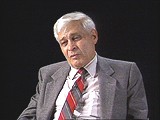
-
Benjamin (Beryl) Ferencz describes collecting evidence
Oral HistoryBen was born in a small village in the Carpathian Mountains of Transylvania in Romania. When he was an infant, his family moved to the United States. Ben attended Harvard University, where he studied criminal law. Ben graduated from Harvard University Law School in 1943. He joined a US anti-aircraft artillery battalion that was training in preparation for an Allied invasion of western Europe. At the end of World War II in Europe, Ben was transferred to the war crimes investigation branch of the US Army. He…

-
Ruth Meyerowitz describes deportation to and conditions in Ravensbrück
Oral HistoryIn Frankfurt, Ruth's family faced intensifying anti-Jewish measures; her father's business was taken over and Ruth's Jewish school was closed. In April 1943, Ruth and her family were deported to Auschwitz. Ruth was forced to work on road repairs. She also worked in the "Kanada" unit, sorting possessions brought into the camp. In November 1944, Ruth was transferred to the Ravensbrueck camp system, in Germany. She was liberated in May 1945, during a death march from the Malchow camp.

-
Blanka Rothschild describes conditions in the Ravensbrück camp
Oral HistoryBlanka was an only child in a close-knit family in Lodz, Poland. Her father died in 1937. After the German invasion of Poland, Blanka and her mother remained in Lodz with Blanka's grandmother, who was unable to travel. Along with other relatives, they were forced into the Lodz ghetto in 1940. There, Blanka worked in a bakery. She and her mother later worked in a hospital in the Lodz ghetto, where they remained until late 1944 when they were deported to the Ravensbrueck camp in Germany. From Ravensbrueck,…
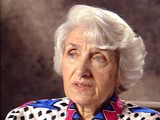
-
Doris Greenberg describes conditions in Ravensbrück
Oral HistoryThe Germans invaded Poland in 1939 and established a ghetto in Warsaw in 1940. After her parents were deported, Doris hid with her sister and other relatives. Doris's sister and an uncle were killed, and she learned that her parents had been killed. Her grandmother committed suicide. Doris was smuggled out of the ghetto and lived as a non-Jewish maid and cook, but was ultimately deported to the Ravensbrück camp. Upon arrival there, Doris and her friend Pepi contemplated swallowing poison, but decided…
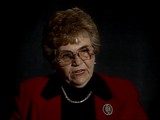
-
Johanna Gerechter Neumann describes Kristallnacht in Hamburg
Oral HistoryAmid intensifying anti-Jewish measures and the 1938 Kristallnacht ("Night of Broken Glass") pogrom, Johanna's family decided to leave Germany. They obtained visas for Albania, crossed into Italy, and sailed in 1939. They remained in Albania under the Italian occupation and, after Italy surrendered in 1943, under German occupation. The family was liberated after a battle between the Germans and Albanian partisans in December 1944.
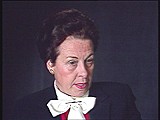
-
Walter Meyer describes activities of members of the Edelweiss Pirates in Duesseldorf, Germany
Oral HistoryWalter was born in Kassel, north central Germany, but grew up in the Rhineland. As a youth, Walter questioned the German superiority and antisemitism he was taught. His father, an anti-Nazi, refused to allow Walter to enter one of the Adolf Hitler Schools, but did permit him to join the Hitler Youth. However, Walter's rebellious streak led him to hide a Jewish friend in his basement. He also formed a gang that played pranks on young Nazis and helped French prisoners of war. They called themselves Edelweiss…
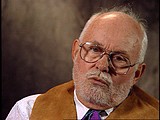
-
Walter Meyer describes his 1943 trial for looting, and the impact of his role in the Edelweiss Pirates on the sentence he received
Oral HistoryWalter was born in Kassel, north central Germany, but grew up in the Rhineland. As a youth, Walter questioned the German superiority and antisemitism he was taught. His father, an anti-Nazi, refused to allow Walter to enter one of the Adolf Hitler Schools, but did permit him to join the Hitler Youth. However, Walter's rebellious streak led him to hide a Jewish friend in his basement. He also formed a gang that played pranks on young Nazis and helped French prisoners of war. They called themselves Edelweiss…
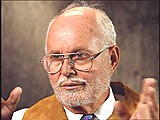
-
Preben Munch-Nielsen describes a fishing boat used to carry Jews to safety in Sweden
Oral HistoryPreben was born to a Protestant family in Snekkersten, a small fishing village. The Germans invaded Denmark in 1940. Preben became a courier in the resistance. When the Gestapo (German Secret State Police) began hunting down Jews in Denmark in October 1943, Preben helped hide refugees in houses near the shore and led them to boats which took them to Sweden. Preben himself had to take refuge in Sweden in November 1943. He returned to Denmark in May 1945.
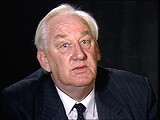
-
Leif Donde describes his family's escape from Denmark to Sweden
Oral HistoryThe Germans occupied Denmark in April 1940, but the Danish government remained in existence and was able to protect Danish Jews. In August 1943, the government resigned after refusing to accede to German demands. German police began to arrest Jews in early October. Leif and his family decided to flee, and were smuggled by fishing boat to safety in Sweden. In Sweden, Leif attended school and his parents worked in a garment factory. The family returned to Denmark after the end of the war.

